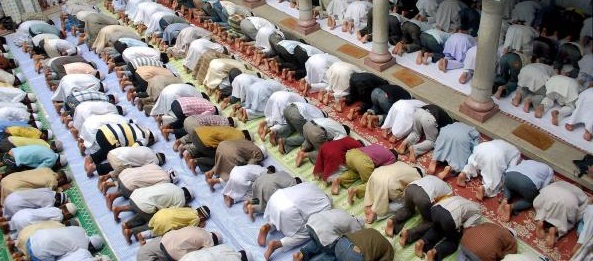
AMN / New Delhi
Prominent Muslim body Jamaat Islami Hind (JIH) on Monday urged the government to exempt places of worship under lockdown 4.0, saying people should be allowed to perform their religious practices maintaining social distancing.
The Jamaat Islami Hind’s Sharia Council also issued an advisory for Muslims on how they should spend the last days of Ramzan and how they should offer the Eid prayer. Advisory was issued by Sharia Council’s President Maulana Jalaluddin Umari and its Secretary Maulana Raziul Islam Nadvi. The Jamaat”s Shariah Council has demanded that the government and authorities should exempt the places of worship under lockdown 4.0, a JIH statement said.
“People should be permitted to practice their religious rites by maintaining social distancing,” it said.”Under the present circumstances, Eid ul Fitr prayer should be offered in Eidgahs (where Eid prayer is offered), Jama Masjid (Grand mosques) and the local mosques (depending on how many numbers of people are permitted),” JIH said, adding that otherwise prayers can be offered at home. JIH also urged people to avoid crowding the markets in the last days of Ramzan.
The Shariah Council in its advisory noted, “the announcement for the lockdown was made at the end of March by the government to deal with the coronavirus. It prohibited congregation at religious places and this prohibition kept on extending. As a result, even in the month of Ramadan, the five times prayer and similarly Juma (Friday) prayer and the Tarawih (special Night prayers) prayer were restricted. Muslims kept offering these prayers at home individually and collectively. This situation may continue for some more time. Hence, we are being asked about the things to be done in the last days of Ramadan and how should the Eid prayer be offered?”
The Shariah Council of Jamaat-e-Islami Hind reflected on it and made the following decisions:
- An important act of the month of Ramadan is the paying of “sadaqatul fitr” (charity must be paid among poor before Eid prayer). It is obligatory on every well to do Muslim to pay the “sadaqatul fitr” for himself/herself and on behalf of his/her family members. One must pay it in the last days of Ramadan. Its quantum can be calculated in terms of dates, raisins, paneer and barley and is one sa’a that is 3.5 KG per person. If it is calculated in terms of wheat then it is half sa’a that is 1.75 KG. Its value in terms of money can also be calculated and in terms of wheat, it comes to about Rs 40/- per person. The amount (Rs 40/- per person) can be increased based on a person’s financial status.
- “Shab e Qadr” (Graceful night when the Qur’an was revealed) can fall on any of the odd nights of the last days of Ramadan. Hence one should offer worship nawafil, recitation of Quran, azkaar, duas etc. on those nights.
- The last Friday of the month of Ramadan is just like other Fridays. It does not have any special significance. Under the present circumstances, if there are 4 people in the house, then they may offer the Friday prayer or the Zohar (Midday) prayer. If a person is alone, then he should offer the Friday prayer individually.
- Under the present circumstances, Eid ul Fitr prayer should be offered in Eidgahs (where Eid prayer is offered), Jama Masajid (Grand mosques) and the local mosques (depending on how many numbers of people are permitted). If there are 4 people in a house then they can offer 2 Rakat of Eid ul Fitr prayer at home with extra “takbeerat”. The “khutbah” (sermon) may be given after the prayer but it is not compulsory. If 4 people are not there, then 4 Rakat nafil prayer should be offered.
- As far as possible, please avoid crowding the markets in the last days of Ramadan. On the day of Eid, whatever clothes, old or new are available, can be adorned and one should thank Allah for it.
- Avoid going here and there on the day of Eid for meeting and greeting people. Please remember the poor, the needy on the day of Eid along with Muslim prisoners and their relatives.
- Please pray that Allah gives us deliverance from the Coronavirus and we can return to our normal lives.